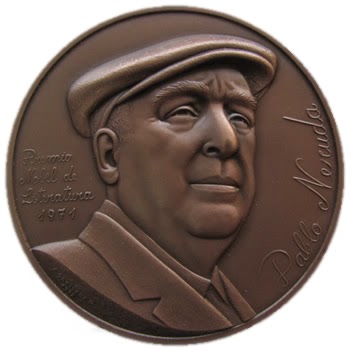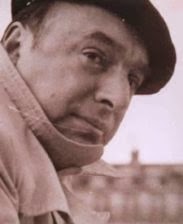poets to write in Spanish in the 20th century. He is regarded as the poet who
cried out against social injustices and was not afraid to voice his opinions.
real name is Neftalí Ricardo Reyes Basoalto, and he was born on July 12, 1904
in the town of Parral, Chile. The poet began to write when he was ten years
old. At the age of 16, while writing for the literary journal “Selva
Austral” he created the pen name of Pablo Neruda, which he adopted in
memory of the 19 th century Czechoslovakian poet Jan Neruda. His father had
tried to discourage him from writing, providing another reason for creating his
pen name, Pablo Neruda.
book: Crepusculario. The following year he published Veinte
poemas de amor y una canción desesperada, one of his best-known and most
translated works. During this time Neruda attended college at the University of
Santiago in Chile, but he abandoned his studies to focus full time on poetry
and politics. By the time Pablo reached the age of twenty his poetry was well
respected but unfortunately he was poor. He was forced to travel to foreign
countries in order to make a living. At the age of only 23 Neruda was appointed
by the Chilean government as consul to Burma (now Myanmar). Between 1927 and
1935, the government put him in charge of a number of honorary consulships,
which took him to Burma, Ceylon, Java, Singapore, Buenos
Aires, Barcelona, and Madrid (where he met and befriended the Spanish poet
Federico García Lorca.) Many of his works published during the Spanish Civil
War turned him into a celebrity political activist.
history and political struggles of South America. Neruda returned to Chile in
1943, and he was elected senator of the Republic in 1945. He also joined the
Communist Party of Chile during this time, and protested against President
González Videla’s repressive policy against striking miners. Neruda’s criticism
of González Videla culminated in a dramatic speech in the Chilean senate on
January 6, 1948 called Yo acuso, in the course of which he read out
the names of the miners and their families who were imprisoned at a
concentration camp. Due to his protests, he had to live underground in his own
country for two years until he managed to leave for Europe in 1949.
established a permanent home in Isla Negra, and in 1966 he was married for the
third and final time to Chilean singer Matilde Urrutia. She was the inspiration
of much of Neruda’s later poetry, including One Hundred Love Sonnets published
in 1960. He continued to travel extensively, visiting Cuba in 1960 and the United
States in 1966.
Salvador Allende was elected president in 1970. Allende appointed Neruda as
Chile’s ambassador to France. He served the position for 2 years, until the
death of the President soon after General Pinochet’s military forces took
control of the country in a violent coup d’etat.
 Neruda was awarded the Nobel Prize for
Neruda was awarded the Nobel Prize forLiterature in 1971 for his humanitarian poetry and activism. However, shortly
after receiving the prestigious award, he died of leukemia in Santiago, Chile
on September 23, 1973. Subsequent to his death, Neruda’s homes in both
Valparaiso and Santiago were looted and vandalized by the armed forces. His
wife moved his body to lie in state amid the rubble in the couple’s Santiago
house, as her way of drawing world attention to the ongoing conduct of
Pinochet’s junta. His funeral took place with a massive police
presence, with mourners taking advantage of the occasion to protest the
Pinochet regime.
During his long literary
career, Neruda produced more than forty volumes of poetry, translations, and
verse drama. Neruda is recognized to be among the major poets of the 20th
century. Four trends are generally associated with Neruda’s writing. The themes
correspond to four aspects of Neruda’s personality: his passionate love life;
the nightmares and depression he experienced while serving as a consul in Asia;
his commitment to a political cause; and his ever-present attention to details
of daily life, his love of things made or grown by human hands.

